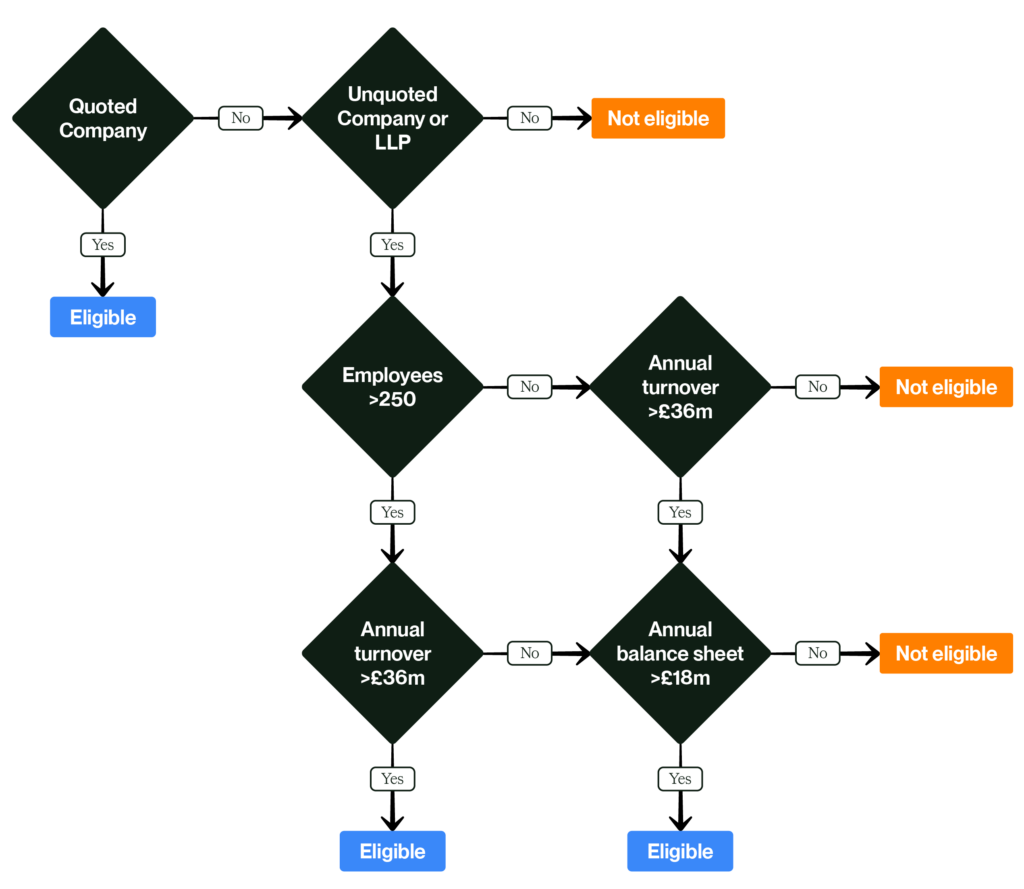Home – Regulations – Streamlined Energy and Carbon Reporting (SECR)
Table of contents
- What is SECR?
- Who needs to comply
- What you need to disclose
- Where to report
- Requirements for Asset Owners
- Key dates
- SECR vs ESOS
- Anthesis support
Share this guide
What is SECR?
Streamlined Energy and Carbon Reporting (SECR) is a mandatory reporting scheme that requires qualifying UK companies to prepare and file energy and carbon information in their Directors’ Report. SECR came into effect in April 2019.
Why was it introduced?
SECR was introduced by the UK Government in April 2019 under The Companies (Directors’ Report) and Limited Liability Partnerships (Energy and Carbon Report) Regulations 2018 with the intention of streamlining, and as a result simplifying, emissions reporting requirements for qualifying organisations.
What does it replace?
For a number of organisations, SECR replaces the Carbon Reduction Commitment (CRC) Energy Efficiency Scheme that ended in 2019. The scheme also replaces and extends Mandatory Greenhouse Gas Reporting (MGHG), which requires quoted companies only to report their annual GHG emissions.
Who Needs to Comply?
A UK company must comply with SECR if they are a quoted company, “large” unquoted company or Limited Liability Partnership (LLP).
A “large” unquoted company or LLP is defined as one which satisfies two or more of the following requirements:
- An annual turnover of £36 million or more
- A balance sheet total of £18 million or more
- 250 or more employees
What about Low Energy Users?
Low Energy Users are defined as companies who fit the above criteria but consume 40MWh or less during the reporting period. Low Energy Users are not required to disclose energy and carbon information, however, they are required to state why it is not being disclosed.
What Do You Need To Disclose?
To comply with SECR, qualifying companies must disclose:
- Their energy use and greenhouse gas (GHG) emissions for their financial year / reporting period
- At least one intensity ratio
- A ‘narrative description’ of any energy efficiency actions taken
- The methodology used to calculate the required information
What if I am already reporting through ESOS?
The Energy Savings Opportunity Scheme (ESOS) and SECR are two separate pieces of legislation with different aims and timelines. ESOS is mandatory for large companies whereby they must submit an energy report to the Environment Agency every four years.
Where should companies report?
Qualifying companies will need to include information on carbon and energy use as part of their annual accounts in line with the SECR framework in their Directors’ Report, or an equivalent Energy and Carbon Report for LLPs, for financial years beginning on or after 1 April 2019. The disclosure may be made in the Strategic Report instead, however a statement in the Director’s report should be made to indicate and explain this decision.
What if I can’t obtain the information?
If energy and carbon information is not practical to obtain, you can exclude this information from your report. However, you must state what information is excluded and say why. BEIS recommends that you set out the steps you are taking to acquire the information.
The Requirement for Asset Owners and Managers
All companies that meet the eligibility requirements for SECR are responsible for making their own energy and carbon disclosures in their annual report.
If obligated, asset owners are required to report on their own operations. We recommend that they also state which of their invested companies are obligated, and which aren’t, but this is not mandatory. Unlike ESOS, there is no “one in, all in” arrangement whereby all subsidiaries are obligated if one entity within the fund meets the criteria. Eligible companies within a fund are responsible for making their own disclosure.
When determining where the regulations are applicable, it is advised that a downward analysis of the group structure is carried out from the highest UK parent as requirements will vary for each investment depending on the eligibility criteria.
SECR’s requirement for companies to calculate and report their greenhouse gas (GHG) emissions in their financial filings will bring both greater internal awareness and external transparency, mirroring a global trend most notably championed by the Task Force for Climate Related Financial Disclosures (the “TCFD”).

Exemption
Companies who consume 40MWh or less during the reporting period do not need to disclose, however, they are required to state why it is not being disclosed.
Overseas subsidiaries
A company should include in its assessment of whether it qualifies, the turnover, balance sheet and employee headcount of its overseas subsidiaries or operations but would not need to report on their energy use and GHG emissions if obligated.
Key Dates
Data reporting aligns with the company’s financial year. Due to the regulations coming into effect in April 2019, the first financial year for which SECR applies is that starting on or after the 1st April 2019 with the disclosure made in the subsequent annual filings.
We would be delighted to discuss how we can support you to complete your SECR report.
How Do ESOS and SECR Compare?
ESOS and SECR are the latest mandatory energy reporting schemes affecting large organisations in the UK. Due to similarities in the qualification criteria, most companies who have recently completed ESOS will be required to comply with SECR.
The Energy Savings Opportunity Scheme (ESOS)
ESOS is the UK’s interpretation of the EU Energy Efficiency Directive (EED), requiring large organisations to undertake energy efficiency audits every four years. The scheme incorporates all organisational energy consumption from buildings, industrial processes and transport, and requires organisations to identify energy-saving measures and the cost of implementing them.
Streamlined Energy and Carbon Reporting (SECR)
SECR came into effect in April 2019, with the first reporting period falling in 2020. SECR replaces the Carbon Reduction Commitment (CRC) scheme, simplifying reporting requirements and drawing in an additional 8,000 businesses into mandatory carbon reporting. Eligible organisations are required to report on their energy consumption and greenhouse gas emissions every year as part of the Directors’ report. SECR aims to increase the transparency and drive implementation of the recommendations from ESOS.
Comparing the Regulations
| ESOS | SECR |
| Eligibility criteria | |
| UK companies with over 250 employees or a turnover of over £38.9 million and a balance sheet of over £33.5 million. | UK Quoted companies and UK registered companies (unquoted and LLP’s) who meet 2 of the following criteria:over 250 employeesa turnover of over £36 milliona balance sheet of over £18 million |
| Exemptions to the criteria | |
| Public bodies as defined by BEIS. | Very low energy users – (40,000kWh or less during the 12-month reporting period).Unquoted companies can apply for an exemption where it is not practical to obtain some or all of the SECR information.Where company directors believe that disclosing SECR information will be seriously prejudicial to the interests of the company. |
| The number of organisations required to comply | |
| Approximately 10,000 organisations. | Approximately 11,900 organisations. |
| Reporting requirements | |
| Total organisational energy consumption from buildings, transport and industrial processes. | Energy use and greenhouse gas (GHG) emissions for their financial year reporting period.The energy efficiency actions taken.The methodology used to calculate the required information.At least one intensity ratio. |
| Report outcomes | |
| A report(s) containing opportunities for energy savings across the organisation. | Disclosure in a company report. E.g. the Directors’ report. |
How Can ESOS Prepare Organisations for SECR?
Those who have just complied with ESOS have a significant advantage when preparing for SECR, as the data collection systems can be actively reused for collecting the energy consumption data required for SECR. In addition, organisations have the opportunity to showcase energy efficiency actions implemented, or planned, as a result of ESOS.
Why Anthesis?
Our experienced team have a long history of supporting clients with energy compliance, including both phases of ESOS as well as Mandatory Greenhouse Gas Reporting. Anthesis offers professional SECR guidance to help companies successfully report on their energy and carbon emissions.
Our compliance model allows organisations to understand what their data is telling them so that the information is both meaningful, and motivational to staff, customers, and other stakeholders. We support clients to manage their energy and emissions, preparing them for future compliance, protecting them against climate-related risk, and supporting commercial growth.
Get in touch
Related Content
Get in touch
We’d love to hear from you
We are the world’s leading purpose driven, digitally enabled, science-based activator. And always welcome inquiries and partnerships to drive positive change together.










